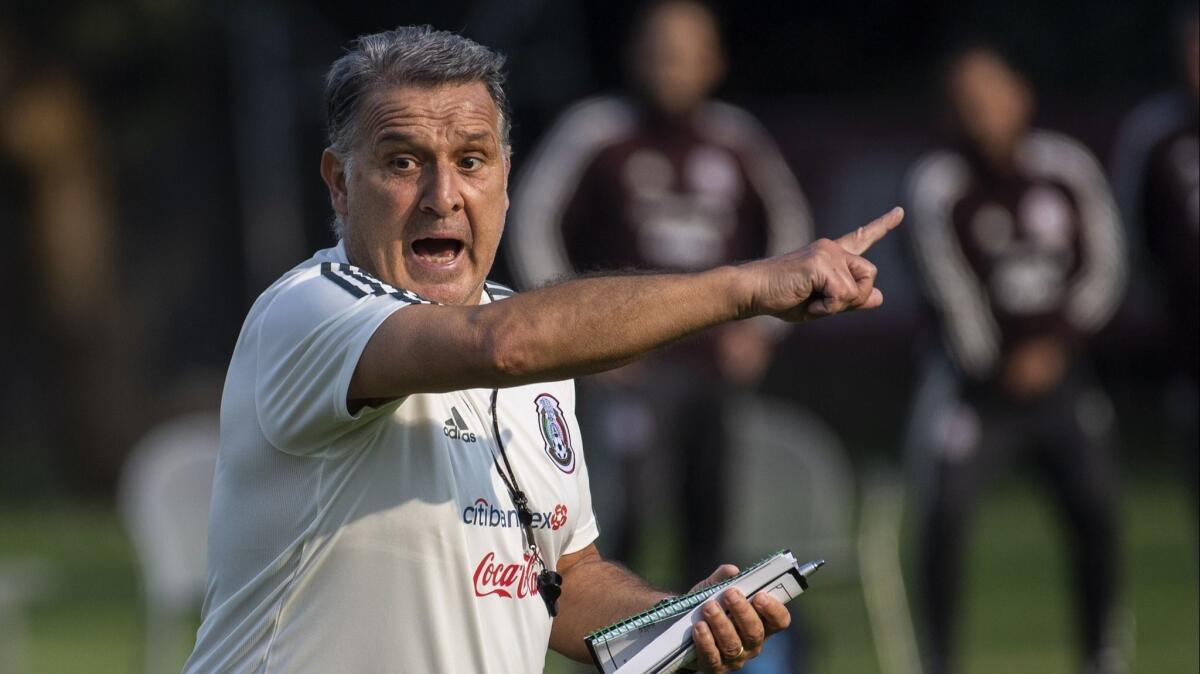Tata Martino talks about taking over Mexico’s national soccer team

- Share via
Mexico’s soccer federation hosted a news conference last month in Los Angeles to introduce new national coach Gerardo “Tata” Martino ahead of his debut Friday night against Chile at SDCCU Stadium in San Diego.
A fan club banged a bass drum and cheered. A video showed fans across Southern California pledging their support and wishing Tata their best. Gerardo Torrado, the federation’s sporting director, introduced Martino in Spanish and English, showering him with platitudes and explaining how he “fits perfectly with the way we want the national team to be coached.”
Martino smiled, walked to the microphone and spoke eloquently about how “it’s a great responsibility, which I am taking with a lot of hopes and dreams.”
Then the questions started.
The first was about the squad rotations — changing lineups and formations every … single ... game — that Colombian predecessor Juan Carlos Osorio employed and that drove Mexico fans absolutely insane even though he won at a rate few had achieved in national team history.
There was a question about the love/hate relationship between the national coach and El Tri’s devoted, passionate, zealous, expectant fan base.
A question about an Argentine, a foreigner, coaching Mexico — again.
A question about whether he’ll use naturalized citizens on the national team.
A question about how he’ll navigate what previous coaches claim were roster selections influenced by the federation for political and commercial reasons.
And then, of course, the obligatory question about the elusive fifth game in the World Cup — el quinto partido — that ranks in life’s certainties at a Mexico soccer news conference somewhere between death and taxes.
Martino answered like he did everything else, politely, diplomatically, cautiously. Yes, he feels great responsibility. Yes, he understands Mexico has reached the second round of seven straight World Cups yet never the quarterfinals (the fifth game). No, it never was discussed it when he was hired. Yes, he is “hopeful, wishful of achieving those goals.”
Martino was hired because he makes shrewd, subtle tactical adjustments. He has a penchant for developing young players. He prefers a pressing, attacking style built on short, quick passing that suits Mexico’s talent pool and mentality.
But more than that, the word you keep hearing from federation officials is “mature.” Martino is 56. Well beyond what he accomplished by winning the Major League Soccer championship with Atlanta United in the club’s second year of existence, he has played and coached in the cauldron of Argentine soccer. He has coached at Barcelona, in Spain’s La Liga, in the UEFA Champions League, in El Clasico against Real Madrid. He has taken national teams from Paraguay and Argentina to major tournament finals.
“He’s a mature person,” said Guillermo Cantu, the federation’s director general. “He has a lot of common sense for the game. I think that is a big asset. His way of seeing the game is very pragmatic.”
Torrado, a former midfielder for El Tri, put it like this: “Just the way he is, he’s so logical, he is so practical. That’s football for me, to apply the simple things during a game.”
El quinto partido has become a fixation in Mexico, a referendum on a nation’s identity. That Mexico is one of only two teams (Brazil is the other) to have advanced out of the first round in the last seven World Cups is forgotten amid the carnage of the fourth game. It doesn’t help that Brazil has won all seven of its second-round games since 1994, including 2-0 against Mexico in Russia last summer, and two World Cup trophies.
Cantu was asked what lessons they learned in Russia.
“We should take away the obsession part of it,” Cantu said of the quarterfinal quest. “It cascades down to players, and players sometimes feel consciously or unconsciously the pressure of having the fifth game.”
There are other lessons, other obstacles. The federation, Cantu said, realizes more Mexican players need to be in Europe’s top five leagues because, the statistics overwhelmingly indicate, they regularly populate the rosters of World Cup quarterfinalists. The thinking is that playing in high-level domestic or European competitions simulate the speed and skill of a World Cup.
It’s logical — and sensitive. When former U.S. national coach Jurgen Klinsmann suggested more players need to leave the comfort of MLS for Europe, MLS Commissioner Don Garber publicly chastised him and sent a cease-and-desist letter to the U.S. Soccer president. There could be similar resistance from owners in Liga MX, reluctant to part with their stars for the purported good of the national team.
The schedule won’t be easy to navigate, either, offering little opportunity to experiment with lineups and tactics before the year’s big event, the CONCACAF Gold Cup in June.
Martino’s debut comes against Chile, a team that occupies a dark space in Mexico’s psyche, architect of a 7-0 spanking in the quarterfinals of the 2016 Copa America Centenario.
His second game is Tuesday night at Levi’s Stadium in Santa Clara. The opponent: Paraguay, which Martino coached to the quarterfinals — the fifth game — of the 2010 World Cup and finals of the 2011 Copa America.
Osorio repeatedly said the margin of error for a foreign coach in Mexico is miniscule. He figured he’d get three losses before fans would start chanting “fuera” (out).
And now, for the first time in the history of its national team, Mexico has replaced a foreign coach with another. A Colombian followed by an Argentine. Martino’s entire staff — three assistant coaches, a goalkeeper coach, two fitness coaches — are Argentine as well.
“I understand,” Martino said in Spanish, “that’s very hard for a national team to have a coach who’s foreign. … We weren’t born in Mexico but once we have this position we put on the Mexico jersey, and we try to do our best.
“I am not one of those who will put on the jersey and will kiss it, because my promise has to be manifested by the work that I do.”
More to Read
Go beyond the scoreboard
Get the latest on L.A.'s teams in the daily Sports Report newsletter.
You may occasionally receive promotional content from the Los Angeles Times.






